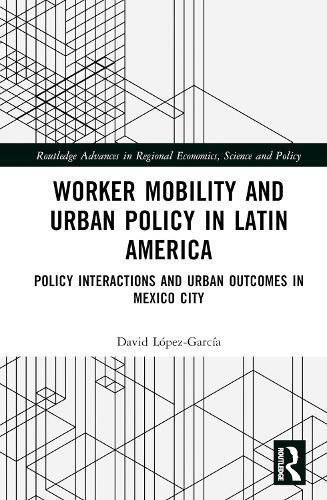Readings Newsletter
Become a Readings Member to make your shopping experience even easier.
Sign in or sign up for free!
You’re not far away from qualifying for FREE standard shipping within Australia
You’ve qualified for FREE standard shipping within Australia
The cart is loading…






This book argues that urban outcomes are better understood as the result of the interactions between policies from distinct policy domains rather than from any single policy silo. In doing so, the book develops and applies the Policy Interactions Framework to the study of the mobility experience of workers in Greater Mexico City.
Four empirical studies provide the reader with a comprehensive view of how urban policies can sometimes interact at cross-purposes to produce inequitable urban outcomes. The chapters analyze time and distance in the journey to work to quantify and map commuting inequalities, assess the shift in the spatial location of the demand for labor between 1999 and 2019, examine the default housing pathways available for workers, and evaluate the spatial distribution of public and common mobility resources. An outcome of applying the Policy Interactions Framework to the study of workers’ mobility is to put forward the choiceless mobility hypothesis: a process by which the interaction between the spatial location of the demand for labor, the housing pathways available for workers, and the political economy of public transport operates to produce geographies of low accessibility to jobs.
The audience of this book consists of scholars and practitioners in the field of urban policy analysis, urban development, and urban political economy in the Global South.
$9.00 standard shipping within Australia
FREE standard shipping within Australia for orders over $100.00
Express & International shipping calculated at checkout
This book argues that urban outcomes are better understood as the result of the interactions between policies from distinct policy domains rather than from any single policy silo. In doing so, the book develops and applies the Policy Interactions Framework to the study of the mobility experience of workers in Greater Mexico City.
Four empirical studies provide the reader with a comprehensive view of how urban policies can sometimes interact at cross-purposes to produce inequitable urban outcomes. The chapters analyze time and distance in the journey to work to quantify and map commuting inequalities, assess the shift in the spatial location of the demand for labor between 1999 and 2019, examine the default housing pathways available for workers, and evaluate the spatial distribution of public and common mobility resources. An outcome of applying the Policy Interactions Framework to the study of workers’ mobility is to put forward the choiceless mobility hypothesis: a process by which the interaction between the spatial location of the demand for labor, the housing pathways available for workers, and the political economy of public transport operates to produce geographies of low accessibility to jobs.
The audience of this book consists of scholars and practitioners in the field of urban policy analysis, urban development, and urban political economy in the Global South.